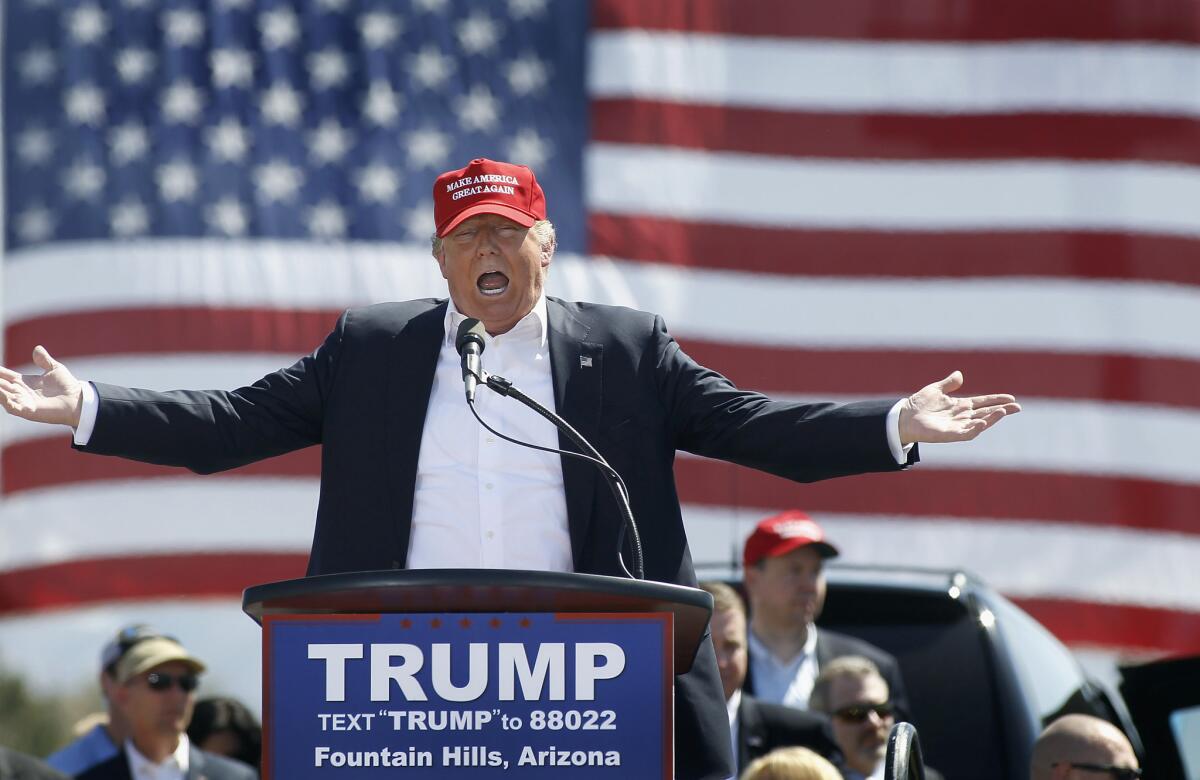Is one of the worst weeks of Donald Trump’s campaign a bump or a turning point?

Donald Trump appears in Fountain Hills, Ariz., on March 19.
- Share via
Reporting from Washington and Green Bay, Wis. — After months of dominating the Republican race, Donald Trump has endured one of his worst weeks since launching his presidential bid, and while he remains the GOP front-runner, his struggles have underscored his weaknesses and increased the possibility that he might fall short of seizing the nomination.
The bad news piled up quickly for Trump: his campaign manager charged with misdemeanor battery for grabbing a female reporter’s arm, a series of interviews with conservative talk radio hosts who pummeled him, a highly regarded poll showing him trailing badly in advance of Wisconsin’s primary next week, and, finally, Wednesday’s fracas over his stand on abortion.
All of those developments deepened existing doubts about Trump. Many Republican strategists worry about his staggering level of unpopularity with female voters, highlighted by the battery charge against campaign manager Corey Lewandowski and Trump’s comment suggesting women should face “some sort of punishment” for getting abortions if the procedure were made illegal.
Those sorts of stumbles, as well as Trump’s calls to talk show hosts whose opposition to him he seemed unaware of, all raised questions about whether he is capable of building and running a campaign operation that can win a general election, experienced political operatives said.
“You’re seeing a campaign that’s making it up as they go along every day. That’s deadly,” said John Brabender, formerly the chief strategist for Rick Santorum’s campaign and now neutral in the race.
Trump’s “renegade campaign” and defiance of political norms “served them fine in the early phases,” Brabender said. Now, however, it’s “hurting Trump a great deal.”
Of course, Trump has proved skeptics wrong time and again, demonstrating that he has a hold on his supporters that has defied conventional political judgment.
Part of what may make this rough patch different is the Wisconsin polling, which has added something beyond anecdote to the forecasting.
Based simply on its demographics — with a large number of blue-collar Republican voters and an average number of conservative, evangelical Christians — Wisconsin would have seemed to be a much better fit for Trump than for his chief rival, Ted Cruz. The Texas senator has relied heavily on religious conservatives for his victories so far.
Instead, Trump trailed Cruz by 10 percentage points, according to the poll conducted by Marquette Law School, which has a strong track record for accurately forecasting the state’s elections. And that was before Trump began attacking Wisconsin Gov. Scott Walker, who remains very popular with Republicans here, in response to Walker’s endorsement of Cruz.
If the poll forecast holds up, it could be enough for Cruz to sweep the state’s delegates under the “winner-take-most” rules of Wisconsin’s GOP primary. That would be a big setback for Trump, who is barely on track to win the 1,237 delegates he would need to avoid a contested convention when Republicans meet this summer in Cleveland.
Trump’s schedule has seemed to suggest that he thinks his chances are poor: While Cruz continues to campaign heavily in the state, Trump spent Thursday in Washington, holding meetings at GOP headquarters. He has not announced plans to return to Wisconsin until Sunday, when he’ll hold a town hall on Fox News.
All that gives cheer to Trump’s adversaries in the GOP.
“It seems like the wheels are coming off a little bit,” said Henry Barbour, a prominent Republican strategist from Mississippi who has backed Trump’s rivals. “It’s not been a good few days, and Wisconsin seems poised to send a message that Donald Trump is not their kind of candidate,” he added.
Trump’s campaign aides did not respond to requests for comment. The candidate himself has begun to complain that he is being treated “unfairly” by Republican rivals. On Tuesday night, he publicly renounced the pledge he had signed in the fall to back the GOP nominee if he loses.
All this comes at a contradictory point in the campaign for Trump. He has defeated one rival after another. But he continues to draw support from only a minority of Republican voters.
Thirty-one states have held Republican primaries or caucuses. Trump has not yet won 50% in any of them, something that front-runners in previous election cycles had begun to do with regularity by this point in their campaigns.
In a nationwide poll released Thursday by the nonpartisan Pew Research Center, 41% of Republicans and Republican-leaning independents said they wanted to see Trump get the party’s nomination; 52% supported someone else.
The share of voters overall who said Trump would be a “terrible” president hit 44%, Pew found, up from 38% in January. Among Republicans, at least half of those backing Cruz or Trump’s other rival, Gov. John Kasich of Ohio, said Trump would be either “terrible” or “poor” as president.
Only 38% of Republican voters predicted that the party would “unite solidly” behind Trump if he were the nominee. That’s a sharp contrast to the Democratic side of the race, where 64% of voters said they expected the party would unite behind Hillary Clinton if she wins, a number on par with previous nominees in both parties.
Lauter reported from Washington and Finnegan from Green Bay.
For more on Campaign 2016, follow @DavidLauter and @FinneganLAT
More to Read
Sign up for Essential California
The most important California stories and recommendations in your inbox every morning.
You may occasionally receive promotional content from the Los Angeles Times.















